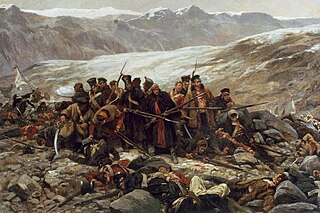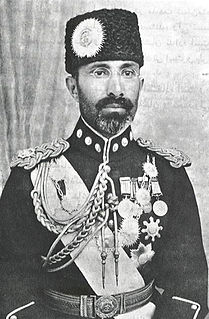Related Research Articles

Khyber Pakhtunkhwa, formerly known as the North-West Frontier Province (NWFP), is one of the four provinces of Pakistan, located in the northwestern region of the country along the International border with Afghanistan.

The Taliban or Taleban, who refer to themselves as the Islamic Emirate of Afghanistan (IEA), are a Sunni Islamic fundamentalist political movement and military organisation in Afghanistan currently waging war within that country. Since 2016, the Taliban's leader is Mawlawi Hibatullah Akhundzada.

Sir Frederick Grant Banting was a Canadian medical scientist, physician, painter, and Nobel laureate noted as the co-discoverer of insulin and its therapeutic potential.

In Ovid's moralizing fable which stands on the periphery of Greek mythology and Roman mythology, Baucis and Philemon were an old married couple in the region of Tyana, which Ovid places in Phrygia, and the only ones in their town to welcome disguised gods Zeus and Hermes, thus embodying the pious exercise of hospitality, the ritualized guest-friendship termed Xenia, or theoxenia when a god was involved.
Pashtunwali is the traditional lifestyle of the Pashtun people, also called the Pathan people. Scholars widely have interpreted it as being "the way of the Pashtuns" or "the code of life". Pashtunwali is widely practised by Pashtuns in the Pashtun regions of Afghanistan and Pakistan, especially among the non-urbanized Pashtuns in the rural areas. Alongside Pashtuns, Afghans and Pakistanis who live close to Pashtuns have also adopted Pashtunwali as they gradually became Pashtunised over time. In addition, members of the Pashtun diaspora practise Pashtunwali.

The First Anglo-Afghan War was fought between the British East India Company and the Pashtun tribesmen from 1839 to 1842. Initially, the British successfully intervened in a succession dispute between emir Dost Mohammad (Barakzai) and former emir Shah Shujah (Durrani), whom they installed upon conquering Kabul in August 1839. The main British Indian and Sikh force occupying Kabul along with their camp followers, having endured harsh winters as well, was almost completely annihilated during its 1842 retreat from Kabul. The British then sent an Army of Retribution to Kabul to avenge their defeat, and having demolished parts of the capital and recovered prisoners they left Afghanistan altogether by the end of the year. Dost Mohamed returned from exile in India to resume his rule.
Cosmopolitanism is the idea that all human beings are, or could or should be, members of a single community. Different views of what constitutes this community may include a focus on moral standards, economic practices, political structures, and/or cultural forms. A person who adheres to the idea of cosmopolitanism in any of its forms is called a cosmopolitan or cosmopolite.

Khošāl Khān Khaṭak (1613 – 25 February 1689; Pashto: خوشال خان خټک), also known as Khushal Baba, was an Afghan/Pashtun poet, chief, and Mughal allied of the Khattak tribe against Pashtun freedom fighters. Khushal Khan did serve Mughals protecting them from Pashtun freedom fighters over most of his lifespan. After expelled from tribal chief position replaced by his son by Mughal emperor, Khushal Khan turned against Mughal. Then after, Khushal preached the union of all Pashtuns, and encouraged revolt against the Mughal Empire, promoting Pashtun nationalism in the last years of his life, through poetry. Khushal wrote many works in Pashto but also a few in Persian. Khushal is considered the "father of Pashto literature" and the national poet of Afghanistan.

Hospitium is the ancient Greco-Roman concept of hospitality as a divine right of the guest and a divine duty of the host. Similar or broadly equivalent customs were and are also known in other cultures, though not always by that name. Among the Greeks and Romans, hospitium was of a twofold character: private and public.

Xenia is the ancient Greek sacred rule of hospitality, the generosity and courtesy shown to those who are far from home or associates of the person bestowing guest-friendship. The rituals of hospitality created and expressed a reciprocal relationship between guest and host expressed in both material benefits as well as non-material ones.

Hospitality is the relationship between a guest and a host, wherein the host receives the guest with goodwill, including the reception and entertainment of guests, visitors, or strangers. Louis, chevalier de Jaucourt describes hospitality in the Encyclopédie as the virtue of a great soul that cares for the whole universe through the ties of humanity. Hospitality is also the way people treat others, that is the service of welcoming receiving guests for example in hotels. Hospitality plays a fundamental role to augment or decrease the volume of sales of an organization hence every business should master it.
Southern hospitality is a phrase used in American English to describe the stereotype of residents of the Southern United States as particularly warm, sweet, and welcoming to visitors to their homes, or to the South in general.
The Mahsud or Mehsud, also spelled Maseed, is a Karlani Pashtun tribe inhabiting mostly the South Waziristan Agency in Federally Administered Tribal Areas of Pakistan. A minor number of Maseed lineages are settled in the Logar Province of Afghanistan, especially in Charkh District, Baraki barak and Muhammad Agha, but also in Wardak, Ghazni and Kunduz Provinces. The Maseeds inhabit the center and north of South Waziristan valley, surrounded on three sides by the Darweshkhel Wazirs, and being shut off by the Bettanis on the east from the Derajat and Bannu districts. Two Pashtun tribes, the Ahmadzai Wazirs and the Maseeds, inhabit and dominate South Waziristan. Within the heart of Maseed territory in South Waziristan lies the influential Ormur (Burki) tribe's stronghold of Kaniguram. The Ormurs are considered by other tribes of South Waziristan to be close brethren of the Maseeds due to marital and other ties and the fact that the Ormurs have lived in and controlled Kaniguram for over a thousand years. There are also some Maseeds living in the UAE, Germany and the United Kingdom.

The Battle of Saragarhi was a last-stand battle fought before the Tirah Campaign on 12 September 1897 between the British Raj Sikh Soldiers and Afghan tribesmen. On 12 September 1897, an estimated 12,000 - 24,000 Orakzai and Afridi tribesmen were seen near Gogra, at Samana Suk, and around Saragarhi, cutting off Fort Gulistan from Fort Lockhart. The Afghans attacked the outpost of Saragarhi where thousands of them swarmed and surrounded the fort, preparing to assault it. Led by Havildar Ishar Singh, the soldiers in the fort—all of whom were Sikhs—chose to fight to the death, in what is considered by some military historians as one of the greatest last stands in history. The post was recaptured two days later by another British Indian contingent.

The 1842 retreat from Kabul took place during the First Anglo-Afghan War. At the beginning of the conflict, British and East India Company forces had defeated the forces of Afghan Emir Dost Mohammad Barakzai and in 1839 occupied Kabul, restoring the former ruler, Shah Shujah Durrani, as emir. However a deteriorating situation made their position more and more precarious, until an uprising in Kabul forced the then commander, Major General Sir William Elphinstone, to withdraw the garrison. To this end he negotiated an agreement with Wazir Akbar Khan, one of the sons of Dost Mohammad Barakzai, by which his army was to fall back to the British garrison at Jalalabad, more than 90 miles (140 km) away. As the army and its numerous dependents and camp followers began its march, it came under attack from Afghan tribesmen. Many of the column died of exposure, frostbite or starvation or were killed during the fighting.
The following lists events that happened during 1898 in Afghanistan.
The following lists events that happened during 1929 in Afghanistan. The Afghan Civil War continued from the previous year.
Pashtunization, also called Pathanization, is a process of cultural or linguistic change in which someone or something non-Pashtun becomes acculturated to Pashtun influence. Pashtuns are the largest ethnic group in Afghanistan and second-largest in Pakistan.
Nanawatai is a tenet of the Pashtunwali code of the Pashtun people. It allows a beleaguered person to enter the house of any other person and make a request of him which cannot be refused, even at the cost of the host's own life or fortune. A similar code of conduct is used by the neighbouring Baluch people.

Muhammad Nadir Shah was King of Afghanistan from 15 October 1929 until his assassination in November 1933. Previously, he served as Minister of War, Afghan Ambassador to France, and as a general in the military of Afghanistan. He and his son Muhammad Zahir Shah, who succeeded him, are part of the Musahiban.
References
- ↑ Banting, Erinn (2003). Afghanistan the People . Crabtree Publishing Company. p. 14. ISBN 0778793354 . Retrieved 2010-10-29.
Erinn Banting.
- ↑ Schultheis, Rob (2008). Hunting Bin Laden: How Al-Qaeda Is Winning the War on Terror . New York: Skyhorse. p. 14. ISBN 9781602392441.
- ↑ Hussain, Rizwan (2005). Pakistan and the Emergence of Islamic Militancy in Afghanistan. Aldershot: Ashgate. p. 221. ISBN 0754644340.
- ↑ Misdaq, Nabi (2008). Afghanistan: Political Frailty and External Interference. Routledge. p. 273. ISBN 9780415470247.